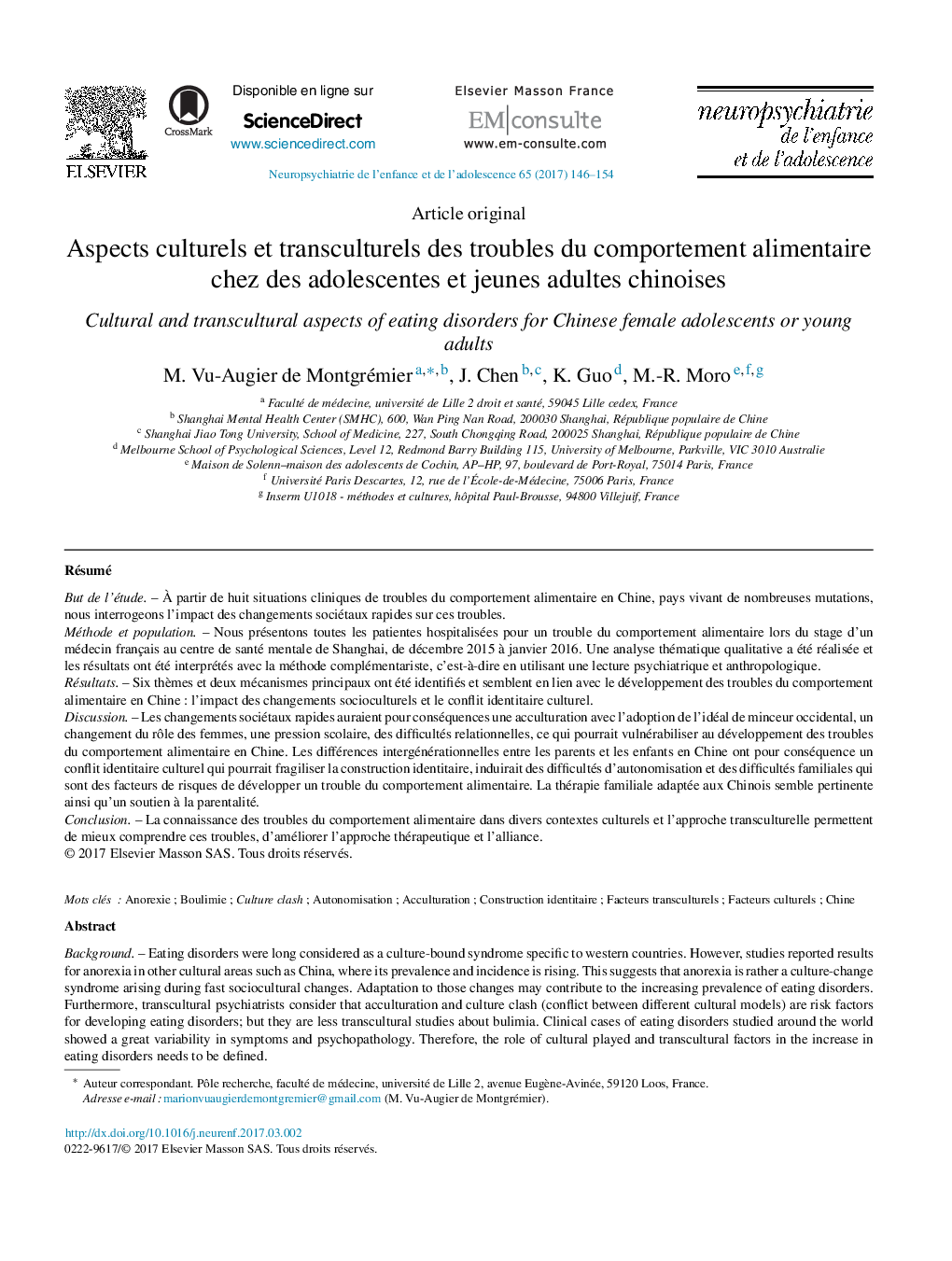| کد مقاله | کد نشریه | سال انتشار | مقاله انگلیسی | نسخه تمام متن |
|---|---|---|---|---|
| 5045015 | 1370649 | 2017 | 9 صفحه PDF | دانلود رایگان |
RésuméBut de l'étudeà partir de huit situations cliniques de troubles du comportement alimentaire en Chine, pays vivant de nombreuses mutations, nous interrogeons l'impact des changements sociétaux rapides sur ces troubles.Méthode et populationNous présentons toutes les patientes hospitalisées pour un trouble du comportement alimentaire lors du stage d'un médecin français au centre de santé mentale de Shanghai, de décembre 2015 à janvier 2016. Une analyse thématique qualitative a été réalisée et les résultats ont été interprétés avec la méthode complémentariste, c'est-à -dire en utilisant une lecture psychiatrique et anthropologique.RésultatsSix thèmes et deux mécanismes principaux ont été identifiés et semblent en lien avec le développement des troubles du comportement alimentaire en Chine : l'impact des changements socioculturels et le conflit identitaire culturel.DiscussionLes changements sociétaux rapides auraient pour conséquences une acculturation avec l'adoption de l'idéal de minceur occidental, un changement du rôle des femmes, une pression scolaire, des difficultés relationnelles, ce qui pourrait vulnérabiliser au développement des troubles du comportement alimentaire en Chine. Les différences intergénérationnelles entre les parents et les enfants en Chine ont pour conséquence un conflit identitaire culturel qui pourrait fragiliser la construction identitaire, induirait des difficultés d'autonomisation et des difficultés familiales qui sont des facteurs de risques de développer un trouble du comportement alimentaire. La thérapie familiale adaptée aux Chinois semble pertinente ainsi qu'un soutien à la parentalité.ConclusionLa connaissance des troubles du comportement alimentaire dans divers contextes culturels et l'approche transculturelle permettent de mieux comprendre ces troubles, d'améliorer l'approche thérapeutique et l'alliance.
BackgroundEating disorders were long considered as a culture-bound syndrome specific to western countries. However, studies reported results for anorexia in other cultural areas such as China, where its prevalence and incidence is rising. This suggests that anorexia is rather a culture-change syndrome arising during fast sociocultural changes. Adaptation to those changes may contribute to the increasing prevalence of eating disorders. Furthermore, transcultural psychiatrists consider that acculturation and culture clash (conflict between different cultural models) are risk factors for developing eating disorders; but they are less transcultural studies about bulimia. Clinical cases of eating disorders studied around the world showed a great variability in symptoms and psychopathology. Therefore, the role of cultural played and transcultural factors in the increase in eating disorders needs to be defined.Method and populationBased on a qualitative study of eight clinical cases of eating disorders in China, a country and a society undergoing and experiencing a lot of fast sociocultural changes, our work aims to show the impact of cultural and transcultural factors on eating disorders, and takes into account the psychopathology and the symptomatology. Patients were hospitalized in Shanghai Mental Health Center and observed during the internship of a French resident in psychiatry.ResultsCultural factors accounted for the symptomatology differences identified with the Western country eating disorders such as: the variability of fat phobia, weight concern, and the absence of denial of thinness. The one child policy bears responsibility for eating disorders in China by improving the academic stress, changing the socialization context, impacting the affiliation process and the family context. Acculturation to western values such as the adoption of an ideal of thinness, growing autonomy claims, and desire for success favors the development of eating disorders. A cultural clash emerges as a consequence of contradictory expectations, of Chinese women's moving roles and of intergenerational gaps between parents and children; all these factors contribute to weaken the identity building, inducing individuation difficulties and parenthood difficulties. Eating disorders in China are also a means to protest against the family. Therefore, family therapy adapted to the Chinese setting seems relevant, together with a specific support for parenthood.ConclusionKnowledge about eating disorders from around the world and the transcultural approach enable a better understanding of these disorders, an enrichment of the diagnostic and therapeutic approach for eating disorders and an improvement of the therapeutic alliance.
Journal: Neuropsychiatrie de l'Enfance et de l'Adolescence - Volume 65, Issue 3, May 2017, Pages 146-154
